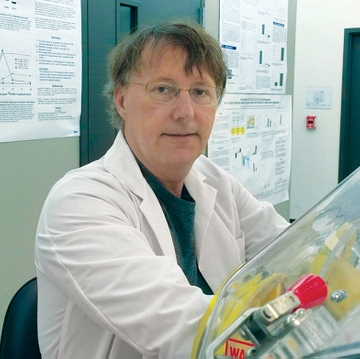Program Provides Research Opportunities for Undergraduate Students

Glimmer of Hope
Existing Drugs Might Help Block Deadly Lung Inflammation From COVID-19
As the COVID-19 pandemic spreads around the world - with lethal consequences for many - scientists have sprung into action to find lifesaving treatments.
University of New Mexico scientists Graham Timmins and Vojo Deretic believe that previously unpublished research they conducted more than a decade ago might offer a glimmer of hope.
The pair say that the common antibiotics azithromycin and ciprofloxacin potentially have lung-protecting properties similar to those reported for chloroquine and hydroxychloroquine, two drugs currently undergoing intensive testing for their potential to reverse the damage caused by the novel coronavirus.
When a COVID patient's lungs come under assault by the novel coronavirus, the body mounts a ferocious immune response, with inflammation playing a key role. But runaway inflammation can turn deadly, causing multiple organ failure. There is clinical evidence that a combination therapy of hydroxychloroquine and azithromycin might arrest the process, although controlled studies have not yet been completed.
In a paper posted two weeks ago on bioRxiv, an online resource for biological research awaiting publication in peer-reviewed scientific journals, Timmins and Deretic reported on their long-ago study of azithromycin as a treatment for patients suffering from cystic fibrosis, an inherited disorder that predisposes them to lung infections.
Azithromycin is known to alleviate symptoms of the disease, which causes the tissue lining the bronchial tubes of these patients to become inflamed, but it appears to do so even when patients don't have an active infection, says Timmins, a professor in the UNM College of Pharmacy who specializes in developing diagnostics and treatments for respiratory infections.
He and Deretic, chair of the Department of Molecular Genetics & Microbiology and director of the Autophagy, Inflammation and Metabolism Center in the UNM School of Medicine, wanted to know why.
The secret, they say, lies in the chemical properties of azithromycin and ciprofloxacin. They are both weak bases, with a pH higher than 7.0. They theorize that the drugs interact with endosomes - tiny membrane-bound compartments inside the lung cells - that have become too acidic, triggering inflammation.
When bases meet acids, they tend to neutralize one another. They hypothesize that the drugs trigger this reaction inside the endosomes, restoring normal immune function to the cells lining the lungs. If true, it could explain why drugs like hydroxychloroquine and azithromycin, which normally defend against parasites and bacteria, might help when the body is attacked by a virus.
"Even small changes in pH change the ways those sites in the cells work," Timmins says. "We think that's the way these drugs work."
If their hunch is correct, it could be a game-changer, Timmins says, because stockpiles of some of the exotic antiviral drugs currently being tested in the COVID-19 crisis are insufficient for the rising number of infections.
"There are a lot of drugs with basic properties," he says. "You could spread out the heavy lift across a whole range of compounds, and maybe there will enough of those so we don't run out of supply."
The need for effective treatments is critical at a time when there is faint likelihood of developing a coronavirus vaccine in the near future and the only effective response has been to enforce social distancing. The unintended consequence of this strategy is that it could destroy the world economy.
"How things get back to normal, I don't know," Timmins says. "I do believe that somebody is going to come up with an effective disease-modifying treatment. It's not a cure, but it changes the trajectory of the disease, so people are sick, but they're not all dying - and maybe that's the best we can hope for."
